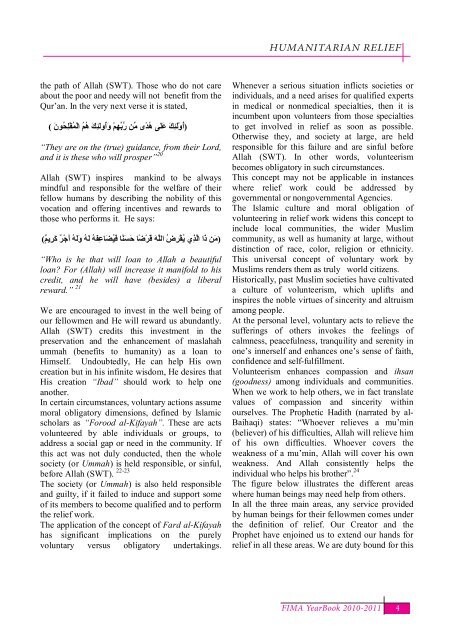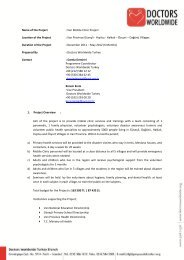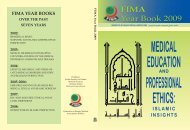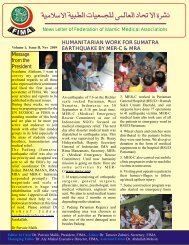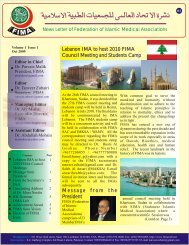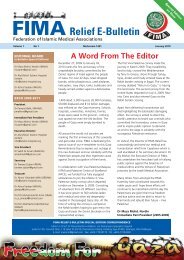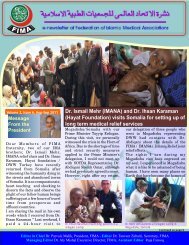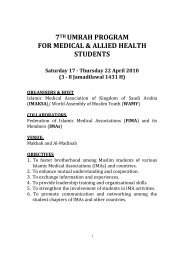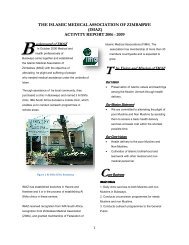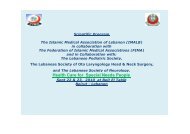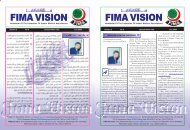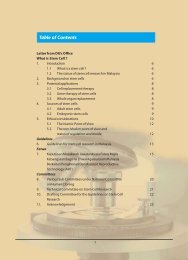FIMA Year Book 2010-2011 - Federation of Islamic Medical ...
FIMA Year Book 2010-2011 - Federation of Islamic Medical ...
FIMA Year Book 2010-2011 - Federation of Islamic Medical ...
You also want an ePaper? Increase the reach of your titles
YUMPU automatically turns print PDFs into web optimized ePapers that Google loves.
Humanitarian Relief<br />
the path <strong>of</strong> Allah (SWT). Those who do not care<br />
about the poor and needy will not benefit from the<br />
Qur’an. In the very next verse it is stated,<br />
) أُوْلَئِكَ عَلَى ھُدًى م ِّن ر َّب ِّھِمْ وَأُولَئِ كَ ھُمُ الْمُفْلِحُونَ (<br />
“They are on the (true) guidance, from their Lord,<br />
and it is these who will prosper” 20<br />
Allah (SWT) inspires mankind to be always<br />
mindful and responsible for the welfare <strong>of</strong> their<br />
fellow humans by describing the nobility <strong>of</strong> this<br />
vocation and <strong>of</strong>fering incentives and rewards to<br />
those who performs it. He says:<br />
(مَن ذَا ال َّذِي یُقْرِضُ الل َّھَ قَرْضًا حَ سَنًا فَیُضَاعِفَھُ لَھُ وَلَھُ أَجْرٌ كَرِیمٌ)<br />
“Who is he that will loan to Allah a beautiful<br />
loan For (Allah) will increase it manifold to his<br />
credit, and he will have (besides) a liberal<br />
reward.” 21<br />
We are encouraged to invest in the well being <strong>of</strong><br />
our fellowmen and He will reward us abundantly.<br />
Allah (SWT) credits this investment in the<br />
preservation and the enhancement <strong>of</strong> maslahah<br />
ummah (benefits to humanity) as a loan to<br />
Himself. Undoubtedly, He can help His own<br />
creation but in his infinite wisdom, He desires that<br />
His creation “Ibad” should work to help one<br />
another.<br />
In certain circumstances, voluntary actions assume<br />
moral obligatory dimensions, defined by <strong>Islamic</strong><br />
scholars as “Forood al-Kifayah”. These are acts<br />
volunteered by able individuals or groups, to<br />
address a social gap or need in the community. If<br />
this act was not duly conducted, then the whole<br />
society (or Ummah) is held responsible, or sinful,<br />
before Allah (SWT). 22-23<br />
The society (or Ummah) is also held responsible<br />
and guilty, if it failed to induce and support some<br />
<strong>of</strong> its members to become qualified and to perform<br />
the relief work.<br />
The application <strong>of</strong> the concept <strong>of</strong> Fard al-Kifayah<br />
has significant implications on the purely<br />
voluntary versus obligatory undertakings.<br />
Whenever a serious situation inflicts societies or<br />
individuals, and a need arises for qualified experts<br />
in medical or nonmedical specialties, then it is<br />
incumbent upon volunteers from those specialties<br />
to get involved in relief as soon as possible.<br />
Otherwise they, and society at large, are held<br />
responsible for this failure and are sinful before<br />
Allah (SWT). In other words, volunteerism<br />
becomes obligatory in such circumstances.<br />
This concept may not be applicable in instances<br />
where relief work could be addressed by<br />
governmental or nongovernmental Agencies.<br />
The <strong>Islamic</strong> culture and moral obligation <strong>of</strong><br />
volunteering in relief work widens this concept to<br />
include local communities, the wider Muslim<br />
community, as well as humanity at large, without<br />
distinction <strong>of</strong> race, color, religion or ethnicity.<br />
This universal concept <strong>of</strong> voluntary work by<br />
Muslims renders them as truly world citizens.<br />
Historically, past Muslim societies have cultivated<br />
a culture <strong>of</strong> volunteerism, which uplifts and<br />
inspires the noble virtues <strong>of</strong> sincerity and altruism<br />
among people.<br />
At the personal level, voluntary acts to relieve the<br />
sufferings <strong>of</strong> others invokes the feelings <strong>of</strong><br />
calmness, peacefulness, tranquility and serenity in<br />
one’s innerself and enhances one’s sense <strong>of</strong> faith,<br />
confidence and self-fulfillment.<br />
Volunteerism enhances compassion and ihsan<br />
(goodness) among individuals and communities.<br />
When we work to help others, we in fact translate<br />
values <strong>of</strong> compassion and sincerity within<br />
ourselves. The Prophetic Hadith (narrated by al-<br />
Baihaqi) states: “Whoever relieves a mu’min<br />
(believer) <strong>of</strong> his difficulties, Allah will relieve him<br />
<strong>of</strong> his own difficulties. Whoever covers the<br />
weakness <strong>of</strong> a mu’min, Allah will cover his own<br />
weakness. And Allah consistently helps the<br />
individual who helps his brother”. 24<br />
The figure below illustrates the different areas<br />
where human beings may need help from others.<br />
In all the three main areas, any service provided<br />
by human beings for their fellowmen comes under<br />
the definition <strong>of</strong> relief. Our Creator and the<br />
Prophet have enjoined us to extend our hands for<br />
relief in all these areas. We are duty bound for this<br />
<strong>FIMA</strong> <strong>Year</strong><strong>Book</strong> <strong>2010</strong>-<strong>2011</strong> 4


